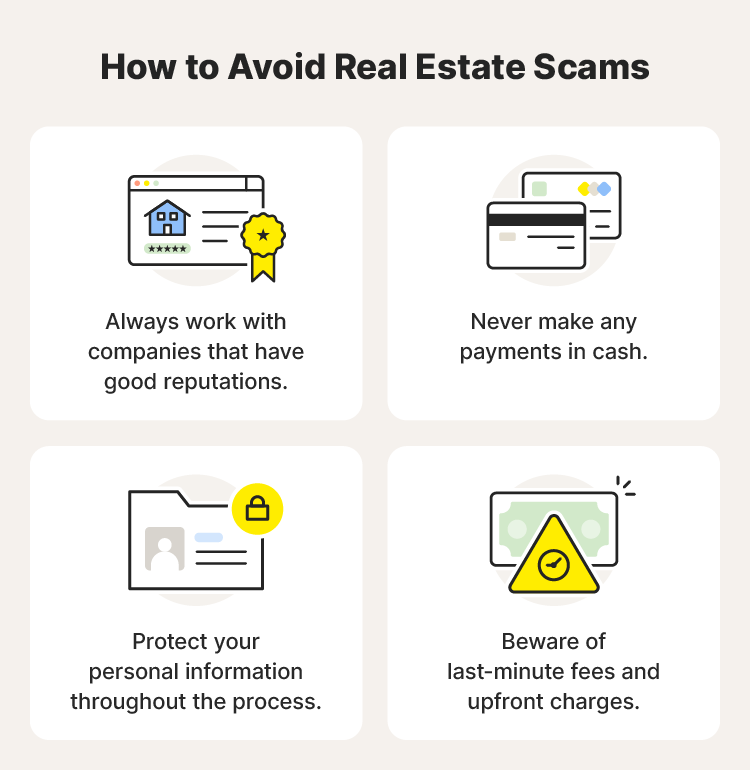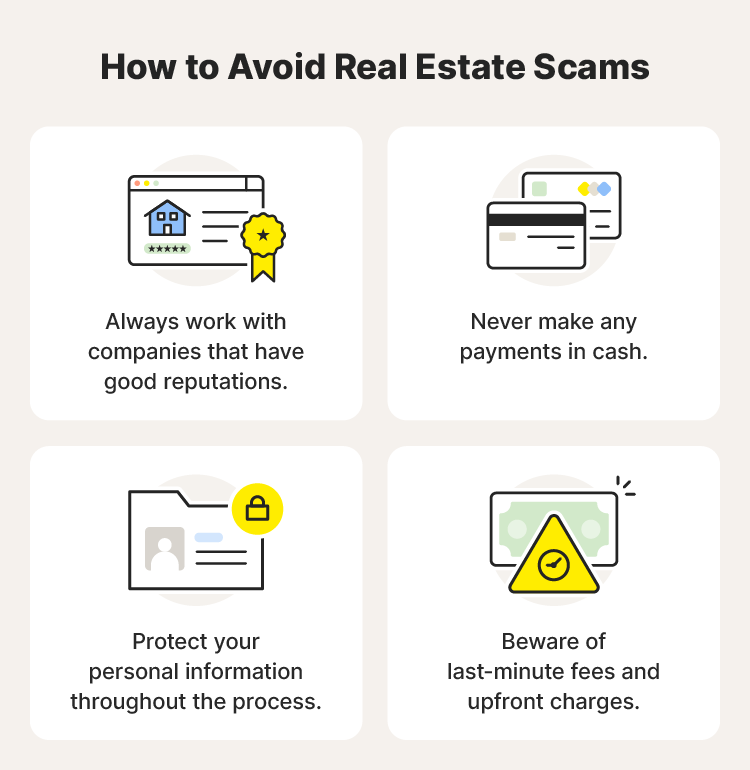Ever heard of someone losing thousands of dollars to a real estate scam? It’s unfortunately a common tale, considering the tempting nature of lucrative property deals. With the rise of digital transactions, fraudsters have refined their methods, creating sophisticated traps for even seasoned investors.
Historically, real estate scams date back centuries, but the digital age has exacerbated the issue. According to a report from the Federal Trade Commission, Americans lost nearly $150 million to real estate scams in 2022 alone. To avoid falling prey, experts suggest thorough vetting of property listings and verification of the seller’s credentials before any financial commitment.
- Verify the property and seller by checking public records and credentials.
- Avoid sharing sensitive personal information and use secure communication channels.
- Beware of deals that seem too good to be true or require large upfront payments.
- Consult with qualified legal and real estate professionals for guidance.

Recognize the Common Types of Real Estate Scams
Understanding the ways scammers operate can save you from significant losses. One common trick is fraudulent property listings. Scammers post fake properties and collect deposits, then disappear.
The phantom rental scam is another widespread issue. Here, fraudsters advertise rentals that aren’t available. They then demand an advance payment to hold the property.
Mortgage closing scams target homebuyers in the process of closing a deal. Criminals hack into email accounts to send fake wiring instructions. Buyers end up transferring money to the scammer’s account.
Equity and foreclosure fraud usually targets struggling homeowners. Scammers promise to help avoid foreclosure but end up stealing your home’s equity. Always verify who you are dealing with in these situations.
Research and Verify the Property and Seller
Ensure you are dealing with legitimate properties and sellers. Conduct thorough research to safeguard your investments. Here are some steps to help with verification.
Check Property History
Look into the property’s ownership history. A sudden increase in price may signal a scam. Request public records to confirm past ownership and transactions.
Consult online databases that track property records. These can reveal previous owners and sale prices. They can also show if the property has been involved in legal disputes.
Talk to neighbors for local insights. They can provide valuable information about the property and any known issues. Always cross-verify with professional records.
Verify Seller/Agent IDs
Ask for identification and verify their credentials. Real estate agents should have a license number. Check their credentials with the local real estate board.
Use online reviews or testimonials to learn more about the seller or agent. Verified reviews offer insights into their reliability. Remember, legitimate agents should have a solid online presence.
Be cautious if the seller is unwilling to meet in person. Scammers often avoid face-to-face interactions. Always insist on a meeting at the property location.
Double-check Documentation
Ensure all property documents are authentic. Fake documents are a common trick used by scammers. Hire a lawyer to review the paperwork.
Compare the seller’s documents with public records. Any inconsistencies should raise red flags. Never rely solely on the documents provided by the seller.
Keep an eye out for forged signatures. Confirm these with the issuing authority. Genuine documents should match the records held by government offices.
Keep Your Personal Information Secure
Protecting your personal information is essential in real estate transactions. Scammers often target sensitive data. Always be cautious about the information you share online and offline.
Use strong passwords for your accounts. This simple step can prevent unauthorized access. Change your passwords regularly to improve security.
Avoid oversharing personal details on social media. Fraudsters scan platforms for potential victims. Limit the information you post publicly.
When sharing financial information, ensure the channel is secure. Look for encrypted websites with “https” in the URL. Never send sensitive data through unsecured emails or messaging apps.
Secure Your Financial Transactions
Using secure financial practices is crucial in real estate. Scammers often target transactions due to the large sums involved. Always verify the platform you are using for payments.
Never pay with wire transfers or gift cards. These methods are hard to trace and can’t be recovered once sent. Stick to official banking channels or secure payment services.
Make sure the website you are using is encrypted. Look for “https” in the URL to ensure it is secure. Avoid making transactions over public Wi-Fi networks.
Double-check the beneficiary account details before making a payment. A simple typo can result in funds being sent to the wrong account. Confirm these details directly with the recipient if possible.
Keep all transaction receipts and confirmations. These documents can serve as proof if anything goes wrong. Documenting your transactions helps in tracking your payments and identifying potential fraud.
Consult with your bank if you receive any suspicious payment requests. Banks can often spot signs of fraud. They also offer secure ways to handle large transactions.
Learn How to Read Real Estate Documents
Reading real estate documents can be overwhelming but is essential. These papers hold key information about property deals. Understanding them ensures you are making informed decisions.
Start by examining the property deed. This document shows who owns the property. Make sure the names and details match what you were told.
Look closely at the mortgage documents. These outline your loan terms and repayment schedule. If anything seems unclear, ask your lender for an explanation.
Check the contract of sale for important clauses. These might include contingencies or stipulations. Knowing these terms prevents unwanted surprises later.
Pay attention to any disclosures provided. Sellers must inform you about known issues with the property. Review these carefully to avoid future problems.
If you’re unsure about any document, consider hiring a lawyer. Legal experts can help clarify complicated terms. They ensure that everything is fair and legitimate.
Work with Reputable Professionals
Choosing the right professionals is key to a smooth real estate transaction. Reputable agents and lawyers can guide you through complex processes. They help you avoid scams and costly mistakes.
Always verify the credentials of any agent you consider. Licensed professionals should have their credentials readily available. You can verify these through your local real estate board.
Look for agents with positive reviews and testimonials. Online platforms often provide ratings and feedback from previous clients. Good reviews indicate reliable and trustworthy service.
Consider hiring a licensed conveyancer to handle legal aspects. They specialize in property law and can ensure all documents are accurate. This adds an extra layer of security to your transaction.
Check the background of any professional you hire. A quick online search can reveal past issues or complaints. Avoid those with a history of legal or ethical problems.
Don’t hesitate to ask for references from previous clients. Speaking to others who have worked with the professional can provide valuable insights. References offer a firsthand account of what to expect.
Familiarize Yourself with Real Estate Laws
Knowing real estate laws can protect you from legal issues and scams. These laws vary by location, so it’s crucial to understand the rules in your area. A good grasp of these laws helps you navigate property transactions confidently.
Start by learning about local zoning laws. Zoning regulations dictate how properties can be used. For example, some areas are designated residential, while others are commercial.
You should also understand property tax laws. Each region has different tax rates and exemptions. Knowing your tax obligations can prevent surprises during the buying process.
Be aware of disclosure requirements for sellers. In many places, sellers must inform buyers about known issues with a property. This includes structural problems or past damages.
If you’re buying or selling across state lines, familiarize yourself with interstate real estate laws. Different states may have unique requirements and restrictions. This is especially important for vacation homes or investment properties.
Finally, international real estate transactions come with their own set of rules. If you’re interested in overseas property, ensure you understand foreign ownership regulations. Working with an attorney who specializes in international law can be beneficial.
When to Report Real Estate Scams
Recognizing the signs of a scam early can save you a lot of trouble. If you encounter anything suspicious during a real estate transaction, it’s crucial to report it immediately. Timely reporting can prevent others from falling victim.
Report a scam if you notice discrepancies in property documents. False information or forged signatures are red flags. Always verify documents with official sources.
Unexpected demands for additional payments should also raise alarms. Scammers often ask for extra fees last minute. Such requests should be reported without delay.
If an agent or seller avoids answering your questions or refuses to provide necessary credentials, it’s time to act. Professional entities should willingly offer transparency. Don’t hesitate to report evasive behavior.
Another sign is pressure tactics to rush a decision. Scammers often create a sense of urgency to push you into a quick deal. Take this as a cue to report the incident.
Finally, report any suspicious online activity related to your transaction. This includes phishing emails or hacked accounts. Online fraud is a serious issue and should be tackled swiftly.
Frequently Asked Questions
Real estate transactions can be daunting, especially with the threat of scams. Here are some common questions and answers to help you navigate safely.
1. What Are Red Flags in Real Estate Deals?
Red flags include unrealistic prices, rushed decisions, and incomplete paperwork. If a deal seems too good to be true, it likely is. Always verify all documents through reliable sources.
Lack of transparency from the seller or agent is another red flag. Reputable professionals should provide clear answers and credentials. Be cautious if they avoid meeting in person.
2. How Can I Verify the Legitimacy of a Real Estate Agent?
You can verify a real estate agent’s legitimacy by checking their license with your local real estate board. Licensed agents often have credentials listed publicly for verification.
Reading online reviews can also provide insight into their credibility. A history of positive feedback indicates reliability, while consistent negative reviews are a warning sign.
3. Why Is It Important to Secure Financial Transactions?
Securign financial transactions prevents fraud and protects your money. Scammers frequently target high-value transactions in real estate deals.
Always use secure payment methods and avoid wire transfers or unconventional payment requests like gift cards. Consult your bank for safest practices.
4. What Should I Do If I Suspect Fraud in My Real Estate Transaction?
If you suspect fraud, report it immediately to local authorities and your financial institution. They can block suspicious activities and investigate further.
You should also inform any professionals involved in the transaction, such as your lawyer or real estate agent, so they can take appropriate actions to safeguard you.
5. How Do Zoning Laws Affect Property Purchases?
Zoning laws dictate how properties can be used within certain areas (e.g., residential vs commercial). Understanding these laws is crucial before purchasing property to ensure it meets your intended use.
Zoning regulations might restrict modifications or usage changes on the property, impacting long-term plans without thorough investigation into local zoning rules.
Conclusion
Staying vigilant in real estate transactions is essential to avoid scams. By researching and verifying all details, you minimize the risk significantly. Partner with reputable professionals to ensure a secure and smooth process.
Remember, safeguarding your personal and financial information is crucial. Always report any suspicious activity immediately to protect yourself and others. Knowledge and caution are your best tools against real estate fraud.

